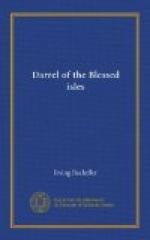Here, the record says, Colonel Barclay was interrupted by laughter and a voice.
“Wal, if there was a railroad, they could scoot back ag’in,” said the voice.
“Yes,” the Colonel rejoined, “but mebbe after they’d been there a while ye’d wish they couldn’t. Wal, you git your own supper, an’ then Sam says, says he, ‘I guess I’ll scoot over t’ Watertown and see my gal fer a few minutes.’ An’ ye sit by the fire a while, rockin’ the twins, an’ by and by yer wife comes back. An’ ye say, ‘Ma, why don’t ye stay t’ home?’ ‘Wal,’ says she, ’it is so splendid, and there’s so much goin’ on.’ An’ Mary, she begins t’ talk as if she’d bit her tongue, an’ step stylish, an’ hold up her dress like that, jest as though she was steppin’ over a hot griddle. Purty soon it’s dizzle-dazzle an’ flippity-floppity an’ splendiferous and sewperb, an’ the first thing ye know ye ain’t knee-high to a grasshopper. Sam he comes back an’ tells Ed all about the latest devilment. You hear of it; then, mebbe, ye begin to limber up an’ think ye’ll try it yerself. An’ some morning ye’ll wake up an’ find yer moral character has scooted. You fellers that go t’ meetin’ here an’ talk about resistin’ temptation—if you ever git t’ goin’ it down there in New York City, temptation ’ll have to resist you. My friends, ye don’t want to make it too easy fer everybody to go somewhere else. If ye do, by an’ by there won’t be nobody left here but them that’s too old t’ scoot er a few sickly young folks who don’t care fer the sinful attractions o’ this world.”
Who shall say that old Colonel Barclay had not the tongue of a prophet?
“An’ how about the cost?” he added in conclusion, “Fellow-citizens, ye’ll have to pay five cents a mile fer yer scootin’, an’ a tax,—a tax, fellow-citizens, to help pay the cost o’ the railroad. If there’s anybody here that don’t feel as if he’d been taxed enough, he ought t’ be taxed fer his folly.”
The dread of “scooting” grew for a time, but wise men were able to overcome it.
In 1850, the iron way had come through the wilderness and begun to rend the northern hills. Some were filled with awe, learning for the first time that in the moving of mountains giant-powder was more efficient than faith. Soon it had passed Hillsborough and was finished. Everybody came to see the cars that day of the first train. The track was lined with people at every village; many with children upon arms and shoulders. They waited long, and when the iron horse came roaring out of the distance, women




